Photographs: Vaihaysi Pande Daniel/Rediff.com
Bollywood, and the high drama that invariably accompanies it, totally overtook the Jaipur Literature Festival on its second day, reports Vaihayasi Pande Daniel.
The filmi duniya and its passionate charcha (chit chat), in multiple sessions chaired by actors Shabana Azmi, Sharmila Tagore, lyricists Javed Akhtar, Prasoon Joshi, foreign Bollywood watchers Rachel Dwyer and Nasreen Munni Kabir, drowned out quieter sessions devoted to philosophy and gentle musings about the meaning of life.
Excitement and adrenaline raced, smoldering issues were unearthed, as conversations at sessions jumped from the legitimacy of screen item numbers to the inexplicable need to produce a film song called Cholee ke peeche kya hai.
Needless to say, Honey Singh's name popped up umpteen times in not so unexpected places, and not in tones of reverence.
Please ...
Crowds swell up; audiences compete with the speakers to be heard
Image: Crowds had pretty much doubled by day 2 at the Jaipur Lit FestPhotographs: Vaihaysi Pande Daniel/Rediff.com
Audiences competed with the speakers to be heard, stomping their feet and clapping at every turn, offering a non-stop stream of questions and views. Stars were swamped for autographs and photographs.
An informative and intelligent but humourously presented talk on the origins of sex by the dishy looking Faramerz Dabhoiwala was another crowd puller on a day when attendees were torn by the desire to be in two places at the same time.
Investment banker and writer Ruchir Sharma and chairman of the new Unique Identification Authority of India, Nandan Nilekani, who had a stimulating discussion on identifying breakout nations -- and whether India's name figured -- held their own against the Bollywood titans and added even more colour to an already electric day.
Crowds had pretty much doubled by day 2. It was refreshing to see the number of youngsters and college and school students, some in uniforms, attending these sessions and participating vigorously with questions and their own takes.
Please ...
Dabhoiwala shook everyone out of their morning blues
Image: Faramerz Dabhoiwala and William Darlymple address a session at the Jaipur Literature Festival on FridayPhotographs: Vaihaysi Pande Daniel/Rediff.com
Historian Dabhoiwala, who has Parsi origins and whose family hails from Mumbai, shook everyone out of their morning blues when he started off the session in the Mughal Tent at Diggi Palace, asking people to raise their hands if they had ever had sex with someone they were not married to!
Lots of hands shot up, some more diffidently.
Apologising, with a wide charming smile, Dabhoiwala explains that if you had ever had sex with someone you were not married to in the 17th century you would have been executed. Sexual privacy was unheard of then.
Dabhoiwala, who was born in Britain and schooled in Amsterdam, went back to England to get a degree, and today teaches history as a senior fellow at Exeter College, Oxford and lives with his partner Jo Dunkley, an astrophysicist at Oxford too. The Origins of Sex began as a PhD thesis and then expanded into a book that took a number of years to complete and publish.
His efforts reaped good dividends as the book quickly attracted positive reviews and collected attention through thousands of tweets from places as distant and unexpected as Saudi Arabia.
The Origins of Sex traces the public attitude to sex from the middle ages onwards, through pictures and archival material and Dabhoiwala kicked of his session in Jaipur with a slide showing a sketch of the sentencing of a couple, tried for fornication in Westminister in 1614.
Please ...
A gripping session
Image: Participants at the JLF on Day 2Photographs: Vaihaysi Pande Daniel/Rediff.com
Starchy puritan attitudes about sex gave way to a renaissance in the attitudes to sex in the 18th century when suddenly British society became much more promiscuous with the establishment of sex clubs (first in Scotland, that causes writer and historian William Dalrymple, who chaired the session, to laugh uproariously. Dabhoiwala quips, "So all of William's ancestors were there") and the encouragement to men to have mistresses in addition to a wife.
Sex clubs, his research discovered, were a fairly mainstream activity that had prosperous, respectable middle-aged men (doctors, lawyers, clergymen) as their patrons. Members regularly gathered together to first, drink loads, out of strange wine glasses that had phalluses coming out of them, to sing, to read out pornography to each other and ogle naked young women who paraded before them and then, as the most important part of the ritual, ejaculate collectively.
Says Dabhoiwala, "(There began a) celebration of sex as the greatest and most important pleasure in life. This is a new idea of the enlightenment. Exactly a hundred years after the execution of Susan Bounty in 1654 (for fornication), it is summed up, most pithily in a great line by the poet-politician John Wilkes in 1754, he wrote 'Life can little more supply than just a few good fucks and then you die.' I love that (line) -- It is often beeped out when I say it on the radio."
But it took much longer, Dabhoiwala explains, for a relaxation of attitude to occur towards adultery by women and homosexuality. The story of William Brown was a case in example. Though he was married, Brown would often go out at night cruising for gay sex.
One night he is caught by a group of policemen, with his hands in another man's britches, making out. According to the police report of that time, that came out in his trial in 1726, when asked what he was doing, Brown is said to have stated, says Dabhoiwala: 'I did it because I thought I knew him. I think there is no crime in making what use I please of my own body.' Given that Brown would subsequently be arrested and his life changed forever, Dabhoiwala admires Brown for this first historical expression of defence of sexual privacy and for his "self possession to come out with that. And I thank him for that."
While at most sessions at the Jaipur Lit Fest, the audience tends to, after a bit, shuffle restlessly, fiddle with their phones or whisper with one another, Dabhoiwala got an alert and very attentive audience, right through to the end. And probably a good many participants, hit the festival book shop, after the session, to pick up a copy of his unusual book.
Please ...
'List of film villains can tell you India's socio-economic history'
Image: Javed Akhtar and Rachel Dwyer during a panel discussion at the Jaipur Literature Festival on FridayPhotographs: Vaihaysi Pande Daniel/Rediff.com
Rachel Dwyer, who is a professor of Indian Cultures and Cinema at University of London, engaged Javed Akhtar in a dialogue on Bollywood and the National Narrative.
Akthar's brittle, straightforward but eminently sensible analysis of what is culturally wrong with India, these days, had instant appeal. The poet and lyricist, elegantly clad as always, in a maroon silk kurta and bandh gala vest, at the outset, chose to lookat India's 100 years of cinema by examining India's cinema villains.
He says: "If you make a list of villains in cinema in India you can write the socio-economic history of India.
"In the 40s the villain of a Hindi picture was a zamindar, a thakur. As the society became urbanized, the capitalist and the industrialist became the villain. As urbanization became more intense and complex the urban mafia became the villain...
"A hero is a personification of contemporary morality and contemporary inspirations... and lo and behold in no time that mafia became the hero... then we had Pakistanis as villains and we got tired of them also. Now the society has no villains. Whatever we looked for in a villain has become our ideals. Kaun banega crorepati. When that becomes your ambition then how do you create a villain?" Applause.
Please ...
'Films these days reflect the fall in values'
Photographs: Vaihaysi Pande Daniel/Rediff.com
Dwyer asks about the apparent shortage of stories/scripts for films these days and asks how that can possibly be so when India is the land of stories. Akhtar says there is only a shortage of stories for commercial films because producers want each time "a brand new story".
He adds: "...I suppose we can mention that name, at least -- Salman Rushdie (Audience laughs) in one of his interviews has said something very wise. He said every tale is a censor in itself. It stops the telling of another story. Every good story, every good saga, every good tale will be bathed in a certain time, certain culture, rooted in certain soil."
But according to him when you make a mainstream Hindi film, the producer does not want it rooted in a particular area or culture, because then the film will not have mass appeal and have only regional pull. So he explains this desire for uniformity has made Hindi films bland. They all have the same architecture. The characters will not have surnames (since that again gives too much regional identity) and there will be a little bit of bhangra and the houses featured in Hindi films will "always have a big hall with the staircase coming down and the father will wear that nightgown (typical night attire). When you have so many conditions then it becomes very difficult to find a story!"
Akhtar speaks also about the multiplex effect on Hindi films. Multiplex film goers are all from a certain background – "for whom happy days (times) have come" -- because they can afford the Rs 500 or Rs 1,000 ticket. "They are not interested in any general social issue which will spoil their evening. Never are the stories of Hindi cinema that devoid of social issues. On one hand the films have become extremely sophisticated. On the other hand the soul, the real genuine heartfelt story is missing. Change has come. Good films are being made but at the same time I won't see a Mother India or a Pyasa." Applause
But the poet feels his own generation was responsible for the headlong aspirations of future generations for wealth alone. Because the older generation despised their elders for being hung up on education and idealism and not having money, they aspired for success and younger generations now have more money, less education and bigger dreams of getting wealth.
He explains, "In my childhood anyone with a telephone was a big man. A car was not even the ambition of the middle class. A radio was a status symbol. If someone bought a fridge they would keep it in the drawing room. We have come a long way.
"But while trying to catch the gravy train we have left some baggage on the platform and that was literature, poetry, art, language, aesthetics. We could not give this to the next generation. In how many houses do you see people having books of poetry? How many people go to a mushaira or a kavi sammelan? No one is interested in literature... Language is shrinking. Today you take an average young person of say 30, 25, 20, that person will have a smaller vocabulary than his or her father or mother."
Films these days, Akthar feels, reflects the giravat (fall) in values. Films are the pulse of the society and today's films are showing that something is wrong with our present society.
Please ...
'We are much to blame to consume things which we find objectionable'
Image: Shabana Azmi and Prasoon Joshi signing autographs during a session at the JLF on Day 2Photographs: Vaihaysi Pande Daniel/Rediff.com
The session that followed close on the heels of Akhtar's, one of the most heavily attended discussions of Day 2 of the lit fest, is about addressing these very aberrations that Hindi films are mirroring.
Chaired by writer/film director Sanjoy Roy, who is in conversation with Shabana Azmi and Prasoon Joshi, Sex and Sensibility: Women and Cinema is a very heated, strident discussion. Both Azmi and Joshi are exceedingly vocal and prefer not to mince words.
Sanjoy wonders aloud to Prasoon how a song like Main to tandoori murgi hoon yaar, gatka le saiyaan alcohol se, came about and what were the compulsions to produce such a song.
"I don't think anyone will expect me to write something like that," answers Prasoon. "The problem starts when we cannot draw a line between what is entertainment and what is crossing the line... You go to a marriage function and you find children dancing to all these songs and the mother says 'Mera beta bahut achcha dance karta hai'. When you type 'rape scene' on You Tube you a get collection of best rape scenes. Who is watching? Where are the millions of hits coming from? (Just) three or four people are perverts or psychopaths. When millions are there they are amongst us. We are as much to blame to consume, repeatedly consume those things which we find objectionable."
Please ...
'Difference between celebration of sexuality and commodification of body parts'
Image: Shabana Azmi and Sanjoy RoyPhotographs: Vaihaysi Pande Daniel/Rediff.com
Shabana staunchly asserts that Hindi cinema has had a role in influencing the way audiences look at women. She speaks her mind in her bold, direct voice: "All art has the ability to create a climate of sensitivity in which it is possible for change to occur....Mythology plays a very dominant role... Ram is the ideal husband and Sita is the quietly acquiescent wife have molded our notion of what the hero and heroine have been and mainstream cinema feeds into that, rather than reflect the growing reality of women today.
"There has definitely been a change from the 60s when mein chup rahongee or I will remain silent was considered a virtue for a woman. To zakmi aurat, insaaf ki devi mein jeene nahin dungee mein marne nahin dungee etc. But there wasn't any real change. First you had Rambos and then you had Rambolina.
"But Hindi cinema had clear divisions between the Madonna and the whore. So the wife, with her head covered, had absolutely no sexuality whatsoever. That was for the vamp. The vamp was created for that purpose. And because of our colonial history, was always a foreign person so she had blonde hair and blue eyes and you could happily lust after her as long as you kept your woman safe at home.
"That started changing and woman started celebrating their sensuality, which is fine, which is wonderful. But there is a difference between a celebration of sensuality and commodification of her body and I think in many of the item numbers today it is commodification because the business of cinema is the business of images. When you have fragmented images of a woman's body, a heaving bosom, a swiveling navel, a swinging hip, fragmented images, you rob a woman of all her autonomy and make her surrender to the male gaze."
Wild applause. Cheers.
Prasoon feels there is a bewildering urge to dumb down a woman's individuality. "Let's go deep down into our psyche. We are in a hurry to make a woman a mother. Why do we celebrate motherhood so much? Ma banjaye, ma ho jaye. Har cheej ma! Jaldi se jaldi you want to get rid of her individuality as fast as possible. Society is scared of her. The moment you make into a mother you have controlled her. Tum toh ma ho, tumhe to aise nahin kahna chahiye. Society has been glorifying motherhood far too much as if that is the be all and end all. And giving her a pseudo sense of satisfaction out of motherhood which bothers me a lot! More hearty clapping. Cheers.
The advertising copywriter, lyricist, screenwriter says he has made a study of common Indian galees and instead of, as they do in other countries, simply saying fuck you, in India they are always talking about "doing something to your mother" -- at which point Sanjoy hurriedly intervenes: "I have already been sued once at this festival... can you say dot-dot-dot." The audience laughs uproariously.
Prasoon continues, "Here we say dot-dot-dot to your mother, dot-dot-dot to your sister." According to him our language reflects our intention to constantly disparage women. He says he also had a quibble with mythology. He says when Krishna takes away the gopis' clothes, that is no less than eve teasing!
Shabana corrects him and says, no that is just courtship, which is very essential, but should not start at the navel.
As the discussion proceeds, it heats up, begins to boil practically, much to the audience's delight. Shabana puts forth the need for actresses to make informed choices about the parts they take on in a script. They should be portrayed as a working woman rather dancing in yellow chiffon saris in the Alps. Hindi films, both Shabana and Prasoon, believe should portray a woman as someone having the ability to choose and make her own decisions.
Please ...
Javed Akhtar rises to the occasion
Image: Javed Akhtar seen in the audience wit Rohini Nilekani and Shabana AzmiPhotographs: Vaihaysi Pande Daniel/Rediff.com
A timid -- well actually, very brave -- man in the audience gets up with a question. He harks back to the special status India has always given to women by worshipping them and he wonders what is wrong with that? What is wrong with putting them on a pedestal and not giving them individuality, because they have a much larger responsibility and importance as mothers and isn't that more crucial than earning a living?
Not surprisingly he is soundly drowned out with raucous boos. Javed Akhtar, who is now sitting in the audience, quickly jumps up to answer this question, as a huge cheer goes up in the crowd.
He says he is absolutely right because god had said this once. "But bhagwan se mera parso baat huee thee, bhagwan ne cancel kar diya (this view)! Boisterous cheers. Claps. Whistles.
Bollywood may have grabbed the lion's share of attention at Diggi Palace this afternoon, yet young, outspoken investment banker and writer Ruchir Sharma, who hails from Jaipur but travels around the world investing large (yes, $ 25 billion) funds on behalf of Morgan Stanley in emerging economies, is able to conquer/win back plenty of notice and interest as he chats about how he makes a decision to invest or not in a country. His book on emerging markets -- Breakout Nations -- he says is an economic travelogue.
Please ...
'Arrogance an indication that India has become complacent'
Image: Ruchir Sharma and Nandan Nilekani addressing a session at the Jaipur Literature Festival on FridayPhotographs: Vaihaysi Pande Daniel/Rediff.com
Sharma, who was in conversation with Nandan Nilekani, says when he arrives in a country, to start an assessment, on whether it has the possibility of becoming an emerging market, he totally immerses himself in that country. "I stay in that country for a week. You be with all the local characters, the politicians, the business people. And when you are in that country you are obsessed with it, because every sensory moment of yours is picking up the inputs because you don't know what you are going to pick up at what point of time."
He has devised, in his book, what he calls rules for the road, which is a list of factor that he looks at, to decide if a country is going to rise in the days ahead. For instance examining the billionaires' list is crucial, to see how the billionaires have come to have their fortune -- was it quick money or money that grew from real entrepreneurial efforts. Equally important is to see if the same billionaires have been on the list for years together or if it is a dynamic list that keeps adding new names. Examining the sentiment of people to assess whether reform, that can bring real growth, is imminent is another important thumbrule.
The banker recalls suddenly having a bad feeling about India when he was invited to a decadent Diwali party at a farmhouse outside Delhi in 2010. "When you entered the valets were sort of juggling the Jaguars and Bentleys, etc. When I entered this place the cuisine was ordered from various countries, the caviar was from Azerbaijan, truffles from Belgium and stuff. I got into a conversation with a young 25-year-old. This young 25-year-old sorted me out very quickly that I was one of those Wall Street types who had come here for investing. He sort of looked at me and said, 'Where else will the money go?' This sort of arrogance from a 25-year-old guy and he was dressed in the typical Delhi exporter's son kind of variety (clothes), wearing this tight black Tshirt, jeans, the hair spiked with gel, and an attitude."
Nilekani interjects wryly, "I hope there aren't any sons of Delhi exporters in the audience!"
That arrogance that Sharma discovered, as his first clue, in the 25 year old, he began to find all over the place in India that trip. And he felt that arrogance was an indication that India had become complacent and was happy to sit back with its windfall rather than to continue to reform and grow and his research further proved that.
The burning question of the session was whether India figured on Sharma's present list of breakout nations along with Philippines and Nigeria, or if it had fallen off the list, along with Russia.
Sharma declares: "It is 50-50." He feels he can only give India, at this point, a 50-50 chance of making it as an emerging economy. The banker recalls that last year when he said 50-50, people in India, who he met, felt 50 was too optimistic. This year people are already asking him if 50 is not too pessimistic. The good signs are that some reforms have started. And he feels there is a good chance that the economy may get more and more de-centralised as chief ministers of several states fiercely compete to get investment. Another positive sign he says is that six chief ministers of India have been re-elected for the third time for their development agendas.
But he is anxious about India's galloping inflation and its increasing corruption -- in a growing, emerging economy these indexes should be decreasing. Leadership is, of course, crucial for any emerging economy and is more important than the form of governance i.e. whether the leader has emerged from an authoritarian rule or was voted in democratically.
Please ...
'Sexist images are not present only in films'
Image: Sharmila Tagore address the audience during a panel discussion at the Jaipur LitFestPhotographs: Vaihaysi Pande Daniel/Rediff.com
Sharmila Tagore, who has just been awarded the Padma Bhushan, was draped in a beautiful chiffon sari over which she had wrapped a shawl. In a discussion with author and television producer Nasreen Munni Kabir, Tagore charmed audiences for nearly an hour with her dignified, gentle conversation on her career, working with the legendary Satyajit Ray, the way Hindi films have evolved and the tough job of censoring films.
At one point she very pertinently asked, "Sexist images are not present only in films/item numbers... A woman can be commodified even if covered from head to toe. You need to read the text correctly, just blaming the image is not the solution. Why do only men sell motorcycles, and sari-clad women washing machines (in ads)? Isn't that sexist?"
They don't make Hindi film actresses as elegant as Tagore anymore!
The evening wound up with poet and former Rediff/India Abroad staffer Jeet Thayil winning the DSC Prize for South Asian Literature of $ 50,000 for Necropolis, a book devoted to the underbelly of Bombay's society, that missed the Booker.
On accepting his prize he said, "I'm glad it finally won something. Don't believe writers when they say money doesn't matter. We, too, have to pay bills. It means a lot to me to win this prize in a country I call home."

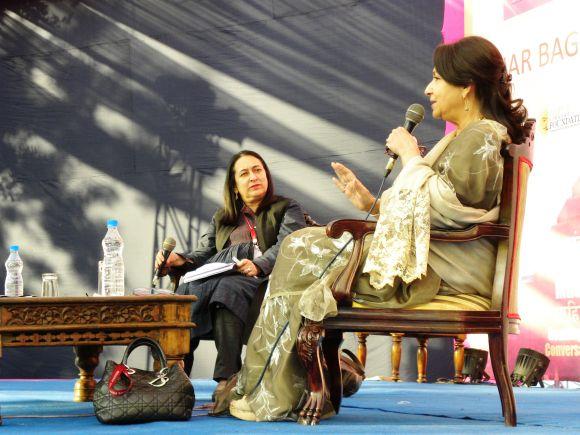

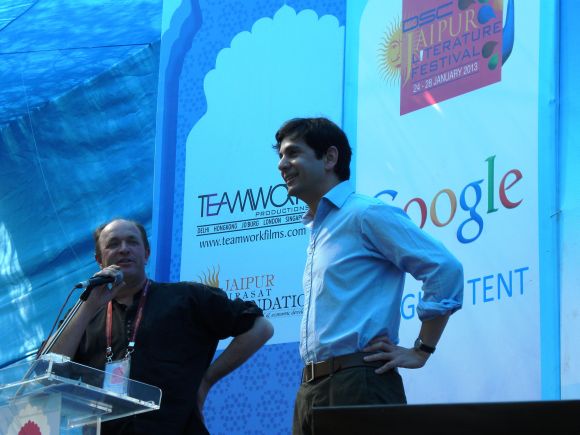
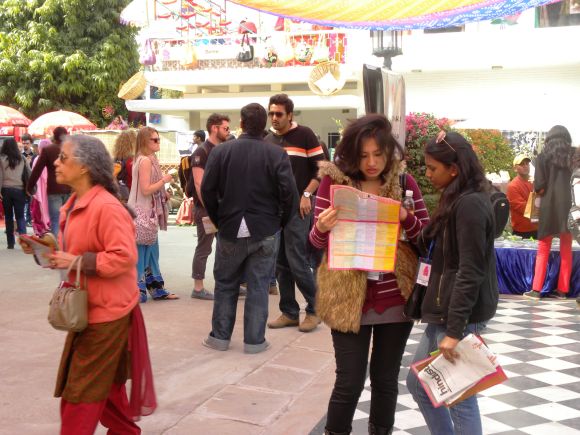
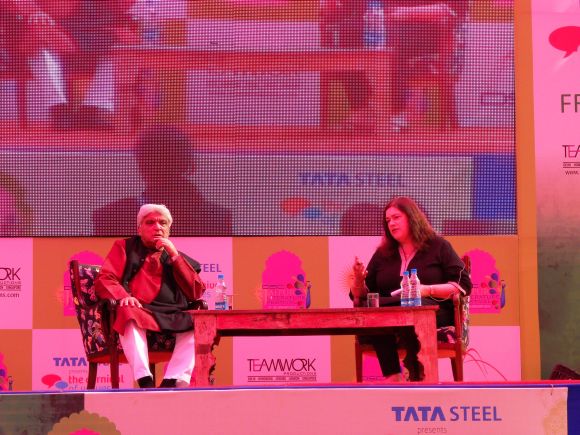
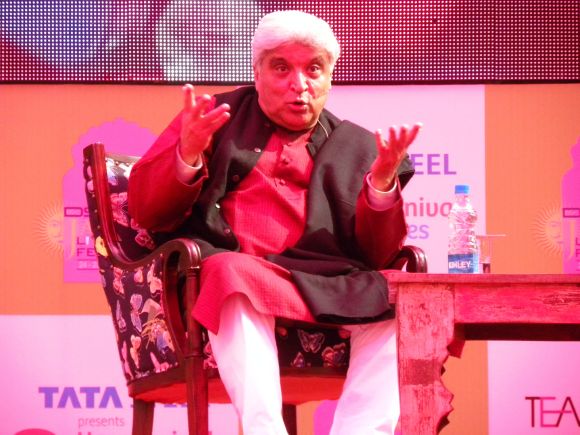
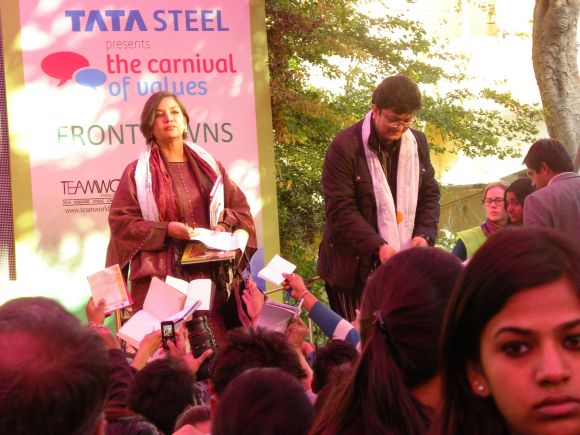

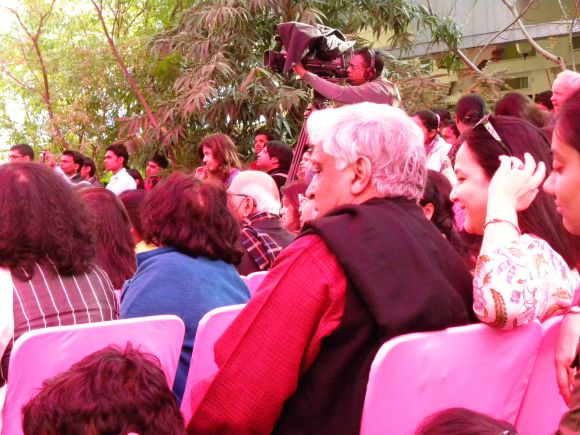
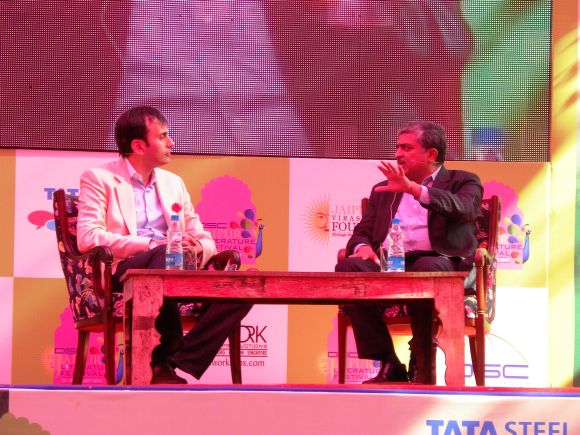
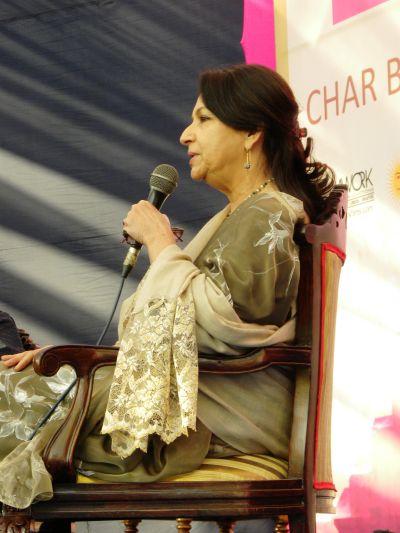
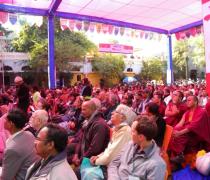
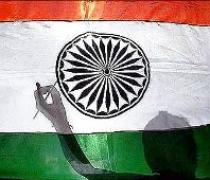
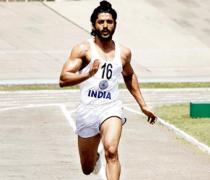
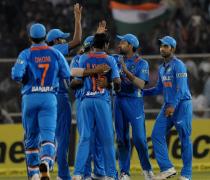
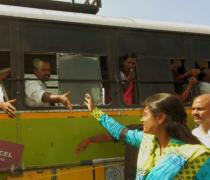
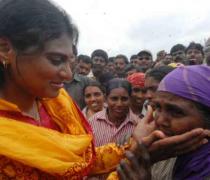
More from rediff